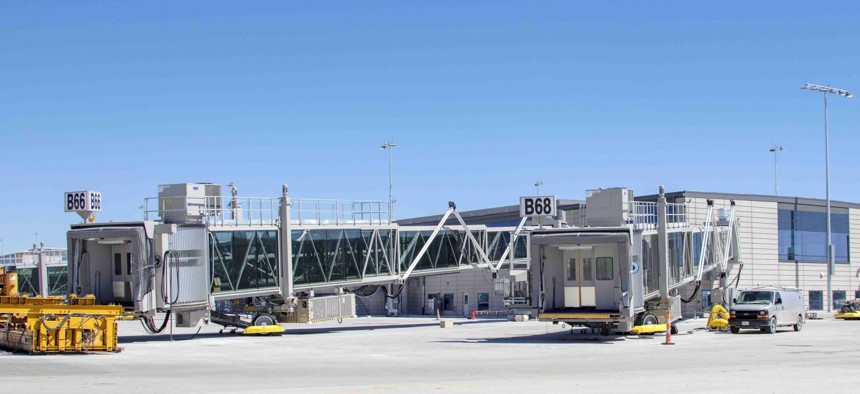Kansas City Hopes Its New ‘Inclusive’ Terminal Will Bring More Flights and Visitors

Kansas City's new airport terminal will include glass jetways, which are still a novelty in the United States. From the Ground Up Photography (used with permission)
The old terminal in Missouri’s largest city lacked convenient bathrooms, food options and security. The $1.5 billion replacement fixes many of those problems.
Kansas City plans to pull off a rare feat among airports at the end of the month: Completely replacing all of its existing gates with brand new ones. City leaders say they’re using the opportunity to make one of the most inclusive airports in the country.
The new terminal in Missouri’s largest city, which is slated to open Feb. 28, has roughly the same number of gates as the existing facility. But the $1.5 billion replacement will include family play areas, changing rooms, all-gender restrooms, a quiet room, dedicated space for nursing mothers, toilet stalls with outward-swinging doors that have red and green light occupancy indicators, and pet relief areas.
Glass-walled jet bridges—still a novelty for U.S. airports—will help passengers feel less anxious getting on and off planes, while offering them great views.
People who are uncomfortable or unfamiliar with commercial flights can use a simulator at the airport to go through the entire process of boarding, taking off and flying to ease their nerves before their actual flight.
That’s on top of the dozens of Kansas City area restaurants, a better set-up for security screening and increased bathroom space near gates that local residents and visitors have been clamoring for.
Providing all of those amenities might have been easier for Kansas City than for many other cities. That’s because Kansas City built a new facility from scratch, said Justin Meyer, the deputy director of aviation for Kansas City. He says the new terminal sets an expectation for inclusivity that passengers will start to expect when traveling to other cities.
“The goal isn’t that we’re forever at the head of the line,” Meyer said. “My goal was just to move the bar, so if someone else wants to build the most accessible airport in the United States or in the world, they’re going to have to start where Kansas City stopped... In the end, passengers win.”

Many airports have been getting upgrades in recent years, as airline profits have increased after industry consolidation, noted Earl Heffintrayer, an airport expert for Moody’s Investors Service. But wholesale replacements of existing terminals like the one in Kansas City are rare. New Orleans and Salt Lake City completed similar projects before the pandemic.
Meanwhile, bigger airports like San Diego, LAX in Los Angeles and LaGuardia in New York have made substantial improvements to existing terminals to accommodate changes in the airline industry. One of the most significant changes has been carriers using bigger planes. (Even Southwest Airlines, which famously only flies 737s, has seen the number of seats on typical flights grow from 130 to 175.) For airports, bigger flights require bigger gates to handle more passengers.
The changing demands of the industry were a big factor in Kansas City pursuing a new terminal building, said Meyer. But another big impetus for the upgrade was that the city’s current airport made traveling even more of a hassle for passengers than in most other major cities.
Passengers flying into and out of Kansas City have long complained about the design of the airport, which opened in 1972. Architects planned the airport to allow passengers to “drive to your gate,” by putting parking garages inside of nearly circular terminals. It was akin to walking into a shopping mall.
But the federal government introduced new security rules 26 days after the airport opened, requiring passengers to go through security before getting to their gates. Kansas City’s airport had no convenient place to put in the checkpoints and, even worse, key amenities like bathrooms and restaurants were on the wrong side of security. The situation got even worse when security protocols tightened after the 2001 terrorist attacks. Now it’s hard to even get a drink to bring onto a plane between transfers, because you can’t bring liquids through the checkpoints.
“The longer you stay in the old terminal, the worse your experience goes,” said Tim Cowden, the president and CEO of the Kansas City Area Development Council. “You can basically track it minute to minute.”
The situation got so bad that Southwest—the airport’s biggest carrier—tried to avoid having passengers transfer through Kansas City, because customers would complain about the experience, Meyer said.
Replacing the existing airport was not easy. Local officials had started drawing up plans for a new terminal as far back as the 1980s, barely a decade after the airport opened, because of the issues with security. But much of the public in Kansas City still enjoyed the “drive-up” nature of the airport, despite the inconveniences at the gate it caused.
What’s more, under Missouri law, the airport had to get approval from city voters to issue the bonds to build the new airport, something most airports don’t have to do. The airlines and their passengers will cover the cost of the new facility through landing fees that are built into ticket prices, but the arrangement still uses public bonds.
“It had one of the most complicated routes to getting financing of any of the airport terminals,” said Heffintrayer from Moody’s.
On the other hand, he noted, the aviation sector has proven itself to be resilient even when confronted with major disruptions like the 9/11 attacks, the Great Recession and the Covid-19 pandemic. So investors were comfortable with backing bonds for the improvements and, in fact, Kansas City benefitted from very low interest rates when it secured financing.
Getting the public to go along was tougher, said Cowden of the development council, who championed the idea at town halls and other meetings. Initial polling showed that only 35% of the public supported a replacement for the existing airport. But by the time of the election in 2017, the measure passed with 75% support.
Gary Kelly, Southwest’s CEO at the time, also visited Kansas City to promote the new terminal. (Although Southwest never promised more service if the terminal was built, the airline has recently indicated it would restart connections to several cities that it served before the pandemic and begin a new route to Long Beach, California.)
Cowden said the opening of the new terminal will also help the region’s economy. The area is expecting an influx of visitors in the coming years for the NFL draft, World Cup games and college basketball’s March Madness. Plus, the region just landed a commitment from Panasonic Corp. to build a battery factory there.
“This new airport terminal truly is the extra boost that this region has needed,” Cowden said. Cowden said business executives have told him they won’t expand in Kansas City because of the airport. “Now, as opposed to the terminal being an excuse not to, the new terminal will be an excuse for companies to do more here.”
Daniel C. Vock is a senior reporter for Route Fifty based in Washington, D.C.
NEXT STORY: What responders really want from their tech






